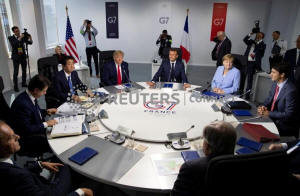Trump moves to ease tensions over China, Iran as G7 summit wraps up
 Send a link to a friend
Send a link to a friend
 [August 26, 2019]
By Jeff Mason and Richard Lough [August 26, 2019]
By Jeff Mason and Richard Lough
BIARRITZ, France (Reuters) - U.S. President
Donald Trump on Monday offered an olive branch to China after days of
intense feuding over trade and opened the door to diplomacy on Iran,
easing tension on the last day of a strained G7 summit.
The leaders of the world's major industrialized nations, meeting in the
French coastal resort of Biarritz, look set to reach an agreement on how
to help fight the Amazon forest fires and try to repair the devastation.
While they are not expected to leave with a more comprehensive set of
agreements or even a joint communique, Trump and his Western allies
appear to have agreed amicably to disagree on issues dividing them.
These ranged from Washington's escalating trade war with China, which
many fear could tip the slowing world economy into recession; how to
deal with the nuclear ambitions of both Iran and North Korea; and the
question of whether Russian President Vladimir Putin should be
readmitted to the group.
Trump, a turbulent presence at last year's G7 gathering, insisted during
the Biarritz meeting that he was getting along well with other leaders
of a group that also comprises Britain, Canada, France, Germany, Italy
and Japan.

The trade war between the United States and China, the world's two
largest economies, escalated on Friday as both sides leveled more
tariffs on each other's exports, sending more shockwaves through
financial markets.
Speaking on the sidelines of the G7 summit on Monday, Trump said he
believed China wanted to make a trade deal after it contacted U.S. trade
officials overnight to say it wanted to return to the negotiating table.
China's lead negotiator in the U.S. trade talks said earlier on Monday
Beijing was willing to resolve its trade dispute with the United States
through "calm negotiations" and resolutely opposed the escalation of the
conflict.
Trump hailed Chinese President Xi Jinping as a great leader and said the
prospect of talks was a very positive development.
"He understands, and it's going to be great for China, it's going to be
great for the U.S., it's going to be great for the world," he said.
"LET THEM BE RICH"
Trump also backed away from confrontation over Iran on Monday, a day
after French President Emmanuel Macron stunned other leaders by inviting
Iran's foreign minister to Biarritz for talks on the stand-off between
Washington and Tehran.
Trump told journalists that they had been wrong to report that he was
blindsided by the five-hour visit of Mohammad Javad Zarif to the
summit's sidelines, and said that while he thought it was too soon for a
meeting he had no objections to it.
European leaders have struggled to calm a deepening confrontation
between Iran and the United States since Trump pulled his country out of
Iran's internationally brokered 2015 nuclear deal last year and
reimposed sanctions on the Iranian economy.
Macron has led efforts to defuse tensions, fearing a collapse of the
nuclear deal could set the Middle East ablaze.
Trump indicated an openness to discussions with Iran on a nuclear deal
and said he was not looking for regime change.
[to top of second column]
|

(L-R) EU Council President Donald Tusk, Italian Prime Minister
Giuseppe Conte, Japanese Prime Minister Shinzo Abe, U.S. President
Donald Trump, French President Emmanuel Macron, German Chancellor
Angela Merkel, Canadian Prime Minister Justin Trudeau attend a work
session during the G7 summit in Biarritz, France, August 26, 2019.
Ian Langsdon/Pool via REUTERS

"I'm looking at a really good Iran, really strong, we're not looking
for regime change," he said. "And we're looking to make Iran rich
again, let them be rich, let them do well."
Trump and Macron met over a long lunch on the first day of the
summit and, as they gathered with other leaders on Monday for
further talks, they greeted each other warmly and smiled.
DIGITAL TAX
Taking more heat out of the annual meeting, French and U.S.
negotiators meeting behind the scenes reached a compromise agreement
on France's digital tax, a levy that had prompted Trump to threaten
a separate tax on French wine imports.
The row had threatened to open up a new front in the trade spat
between Washington and the EU as economic relations between the two
appeared to sour.
France's 3% levy applies to revenue from digital services earned by
firms with more than 25 million euros in French revenue and 750
million euros ($830 million) worldwide.
U.S. officials complain it unfairly targets U.S. companies like
Facebook, Google and Amazon. They are currently able to book profits
in low-tax countries such as Ireland and Luxembourg, no matter where
the revenue originates.
A source close to the negotiations said the deal envisaged that
France would repay to companies the difference between a French tax
and a planned mechanism being drawn up by the OECD.
The G7 leaders were due to discuss climate change in one of their
final sessions on Monday and were expected to consider a deal on
technical and financial help for the Amazon.
A record number of fires are ravaging the rainforest, many of them
in Brazil, drawing international concern because of the Amazonís
importance to the global environment.
Macron shunted the blazes fires to the top of the summit agenda
after declaring them a global emergency. Last week he accused
Brazilian President Jair Bolsonaro's government of not doing enough
to protect the area and of lying about its environmental
commitments.

(Reporting by Richard Lough, John Irish, Crispian Balmer, Marine
Pennetier, John Chalmers, Jeff Mason, William James, Andreas Rinke
and Michel Rose; Writing by John Chalmers; Editing by Alison
Williams)
[© 2019 Thomson Reuters. All rights
reserved.]
Copyright 2019 Reuters. All rights reserved. This material may not be published,
broadcast, rewritten or redistributed.
Thompson Reuters is solely responsible for this content. |